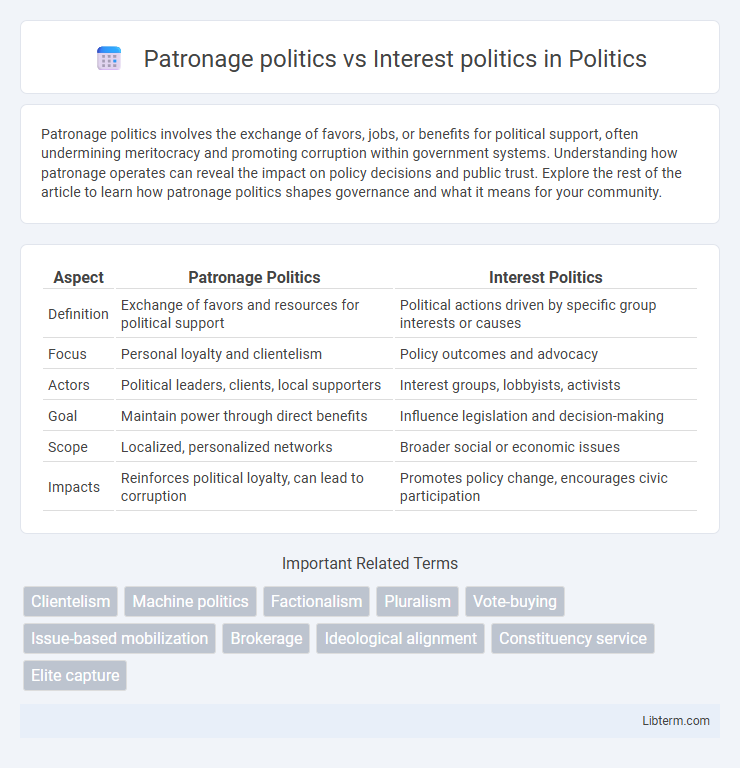Patronage politics involves the exchange of favors, jobs, or benefits for political support, often undermining meritocracy and promoting corruption within government systems. Understanding how patronage operates can reveal the impact on policy decisions and public trust. Explore the rest of the article to learn how patronage politics shapes governance and what it means for your community.
Table of Comparison
| Aspect | Patronage Politics | Interest Politics |
|---|---|---|
| Definition | Exchange of favors and resources for political support | Political actions driven by specific group interests or causes |
| Focus | Personal loyalty and clientelism | Policy outcomes and advocacy |
| Actors | Political leaders, clients, local supporters | Interest groups, lobbyists, activists |
| Goal | Maintain power through direct benefits | Influence legislation and decision-making |
| Scope | Localized, personalized networks | Broader social or economic issues |
| Impacts | Reinforces political loyalty, can lead to corruption | Promotes policy change, encourages civic participation |
Understanding Patronage Politics: Definition and Key Features
Patronage politics involves the exchange of goods, services, or political favors in return for electoral support, characterized by personal relationships and loyalty. Key features include clientelism, where patrons provide benefits to clients to secure votes, and a hierarchical structure centered around political leaders distributing resources. This system contrasts interest politics by focusing on individual or group loyalty rather than policy-driven collective action.
Interest Politics Explained: Concepts and Characteristics
Interest politics centers on organized groups seeking specific benefits or policy outcomes through collective action, emphasizing shared goals and professional advocacy. These groups, such as labor unions or business associations, influence government decisions by mobilizing resources, expertise, and lobbying efforts to promote their interests. The defining characteristics include goal-oriented behavior, sustained group organization, and reliance on political bargaining rather than personal favors or patron-client relationships.
Historical Evolution of Patronage vs Interest Politics
Patronage politics originated in ancient civilizations, where rulers granted favors and positions to loyal supporters, consolidating power through personal networks and reciprocal obligations. Interest politics emerged alongside the expansion of democratic institutions in the 19th and 20th centuries, emphasizing organized groups lobbying for policy preferences based on shared economic or social interests. The shift from patronage to interest politics reflects broader political modernization, moving from personalized power dynamics to structured advocacy and institutionalized policy influence.
Patronage Politics in Modern Governance
Patronage politics in modern governance involves allocating resources and political favors to supporters in exchange for loyalty, often undermining meritocracy and transparency. This practice contrasts with interest politics, where organized groups advocate for specific policy outcomes based on shared concerns. Patronage politics can lead to clientelism, eroding institutional trust and skewing public administration towards personalized networks rather than institutional efficiency.
The Role of Interest Groups in Political Systems
Interest groups play a crucial role in political systems by representing specific societal interests and influencing policy decisions through lobbying, advocacy, and mobilization. Unlike patronage politics, which relies on personal relationships and the distribution of favors, interest politics centers on organized groups promoting collective goals and issue-based agendas. This institutionalized form of political participation enhances democratic accountability by providing channels for citizen engagement and policy responsiveness.
Societal Impacts of Patronage and Interest-Based Politics
Patronage politics often leads to favoritism, undermining meritocracy and fostering corruption, which weakens institutional trust and social cohesion. Interest-based politics encourages organized representation of diverse groups, promoting policy responsiveness but can intensify competition and deepen societal divisions. Both systems influence democratic engagement, with patronage eroding transparency and interest politics shaping advocacy and political participation patterns.
Corruption and Accountability: Comparing Both Models
Patronage politics often leads to higher levels of corruption due to the exchange of favors and resources for political support, undermining accountability and public trust. Interest politics promotes transparency and policy-driven advocacy, enabling more accountable governance by aligning political actions with specific group demands and legal frameworks. However, both models face challenges in preventing corrupt practices, with patronage systems generally exhibiting weaker mechanisms for holding actors accountable.
Policy Outcomes: Patronage Networks vs Interest Representation
Patronage politics often results in policy outcomes favoring personal loyalty and resource distribution within tightly knit networks, which can lead to inefficiencies and corruption. Interest politics emphasizes formal representation of organized groups, promoting policies aligned with collective needs and long-term sectoral benefits. Consequently, patronage networks prioritize immediate favors, while interest representation tends to produce more transparent and stable policy frameworks.
Case Studies: Global Examples of Patronage and Interest Politics
Patronage politics often manifests in countries like India, where political loyalty is rewarded with government jobs or contracts, contrasting with interest politics observed in the United States, where organized groups such as lobbyists influence policy based on specific economic or ideological interests. In Nigeria, patronage networks underpin political stability by distributing resources within ethnic groups, while European Union lobbying exemplifies interest politics, emphasizing policy changes through formal advocacy. These global examples illustrate how patronage relies on personal relationships and reciprocal favors, whereas interest politics centers on collective action and issue-based mobilization.
Future Trends: Shifting from Patronage to Interest Politics
Future trends indicate a significant shift from patronage politics, characterized by personal loyalty and direct favors, toward interest politics driven by organized groups advocating specific policy goals. This transformation aligns with increasing political awareness, technological advancements, and the rise of social media platforms enabling issue-based mobilization and transparency. As democratic institutions strengthen globally, interest politics is expected to promote more inclusive and accountable governance, reducing reliance on patronage networks.
Patronage politics Infographic

 libterm.com
libterm.com